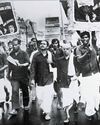Essayer OR - Gratuit
An Outsider Between The Posts
Outlook
|October 30, 2017
Football’s lesson in dispossession wasn’t in vain. East Bengal’s thraldom reigned at a distance; then came a sudden reinforcement of the refugee status.

‘Anyone who is an East Bengal fan is always right!’
—Ravindran Sriramachandran, Asoka University
During my childhood, I remember a very quiet man from Calcutta who twice visited our Railway Colony apartment in Assam. He was a relation of father’s, and I called him uncle. But I do not remember his name or other details. My only memory of him is his lying in bed, reading the newspaper. Despite being a talkative and inquisitive kid, I hesitated speaking to him. But his strange, fleeting presence persists in my mind, because on both his visits he gifted me a football.
The first one he got me was black and white in colour. I don’t remember much about it. Except that I triumphantly took it to my friends in the neighbourhood, and we played with it every evening, as it slowly lost colour. Only after the leather got torn at too many places did we finally abandon it. I remember the second one better. Not only because I was more grown up by then, but for the ball’s colour. It was red and yellow. That was the jersey colours of my favourite team, East Bengal.
To be gifted a football at a young age teaches you things you may not realise then. A gift is meant to be something you alone possess and have the sole right over. It is what you savour with care. But here was a gift you were dying to share with others. Here was a gift that would be kicked around, get muddied. During the match I would mostly watch others play and wait for my chance. You realise later, a football is a rare gift that is barely yours. It is a gift you gift away, a gift that belongs to others. A football is a gift that teaches you dispossession.
Cette histoire est tirée de l'édition October 30, 2017 de Outlook.
Abonnez-vous à Magzter GOLD pour accéder à des milliers d'histoires premium sélectionnées et à plus de 9 000 magazines et journaux.
Déjà abonné ? Se connecter
PLUS D'HISTOIRES DE Outlook

Outlook
The Big Blind Spot
Caste boundaries still shape social relations in Tamil Nadu-a state long rooted in self-respect politics
8 mins
December 11, 2025

Outlook
Jat Yamla Pagla Deewana
Dharmendra's tenderness revealed itself without any threats to his masculinity. He adapted himself throughout his 65-year-long career as both a product and creature of the times he lived through
5 mins
December 11, 2025

Outlook
Fairytale of a Fallow Land
Hope Bihar can once again be that impossibly noisy village in Phanishwar Nath Renu's Parti Parikatha-divided, yes, but still capable of insisting that rights are not favours and development is more than a slogan shouted from a stage
14 mins
December 11, 2025

Outlook
The Lesser Daughters of the Goddess
The Dravidian movement waged an ideological war against the devadasi system. As former devadasis lead a new wave of resistance, the practice is quietly sustained by caste, poverty, superstition and inherited ritual
2 mins
December 11, 2025

Outlook
The Meaning of Mariadhai
After a hundred years, what has happened to the idea of self-respect in contemporary Tamil society?
5 mins
December 11, 2025

Outlook
When the State is the Killer
The war on drugs continues to be a war on the poor
5 mins
December 11, 2025

Outlook
We Are Intellectuals
A senior law officer argued in the Supreme Court that \"intellectuals\" could be more dangerous than \"ground-level terrorists\"
5 mins
December 11, 2025

Outlook
An Equal Stage
The Dravidian Movement used novels, plays, films and even politics to spread its ideology
12 mins
December 11, 2025

Outlook
The Dignity in Self-Respect
How Periyar and the Self-Respect Movement took shape in Tamil Nadu and why the state has done better than the rest of the country on many social, civil and public parameters
5 mins
December 11, 2025

Outlook
When Sukumaar Met Elakkiya
Self-respect marriage remains a force of socio-political change even a century later
7 mins
December 11, 2025
Translate
Change font size
